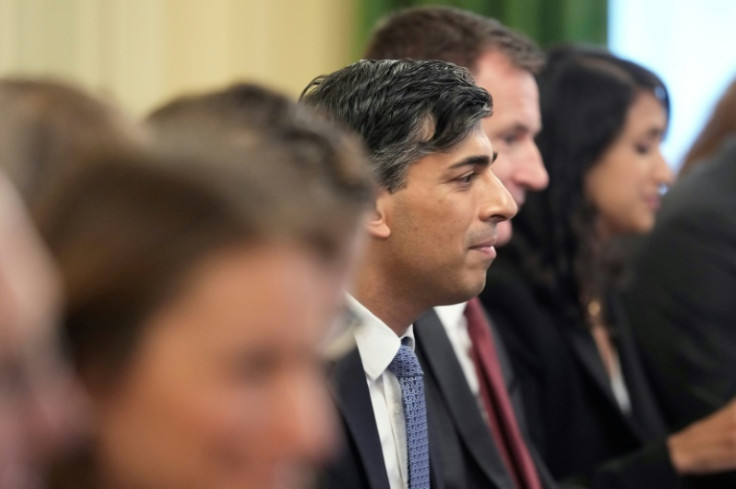UK Inflation Falls Sharply, Relieving Pressure On PM Sunak
UK inflation hit the lowest level in two years last month after consumer prices fell sharper than expected on easing energy bills, official data showed Wednesday, relieving a cost-of-living crisis and pressure on embattled Prime Minister Rishi Sunak.

UK inflation hit the lowest level in two years last month after consumer prices fell sharper than expected on easing energy bills, official data showed Wednesday, relieving a cost-of-living crisis and pressure on embattled Prime Minister Rishi Sunak.
The Consumer Prices Index stood at 4.6 percent in October, the Office of National Statistics said, dipping under a five-percent target set by Sunak, who faces a crisis in his Conservative party ahead of next year's general election.
CPI inflation slowed more than forecast by the Bank of England and analysts after reaching 6.7 percent in September.
"Official figures... confirm we have halved inflation, meeting the first of the five priorities I set out at the beginning of this year," Sunak said in a statement.
"But while it is welcome news that prices are no longer rising as quickly, we know many people are continuing to struggle, which is why we must stay the course to continue to get inflation all the way back down to two percent," he added, referring to the Bank of England's target.
UK annual inflation struck a 41-year peak at 11.1 percent in October 2022, stoked by spiking energy prices after the invasion of Ukraine by major oil and gas producer Russia.
Sunak, who this week sacked Suella Braverman as interior minister and appointed former prime minister David Cameron as foreign secretary, has hit a brick wall with his other priorities, which include growing the economy and stopping boatloads of migrants crossing the Channel from France.
His Conservative party is seen as unlikely to win re-election in the next national vote, losing out to the main opposition Labour party.
Grant Fitzner, chief economist at the ONS, said "inflation fell substantially" last month on easing energy costs following last year's steep rise.
"Food prices were little changed on the month, after rising this time last year, while hotel prices fell, both helping to push inflation to its lowest rate for two years," he added.
Analysts said a sharp fall in the annual inflation rate could see finance minister Jeremy Hunt cut taxes in his latest budget announcement due next week.
They add that the drop in UK inflation since the start of the year from the highest level in decades is thanks largely to interest-rate hikes from the independent Bank of England (BoE) and cooler energy prices worldwide.
Interest-rate hikes by other major central banks, including the US Federal Reserve and European Central Bank (ECB), have helped bring down elevated inflation in the world's biggest economy and the eurozone.
US consumer inflation cooled more than expected last month, government data showed Tuesday.
The CPI inflation gauge increased 3.2 percent in the 12 months to October, down from 3.7 percent a month earlier.
Global inflation remains high, however, with the Fed and ECB also having an annual inflation target rate of two percent.
Economists have stressed that stubbornly-high inflation could prompt central banks to keep interest rates at high levels for many more months -- and may even be forced to keep on hiking borrowing costs.
This has fuelled worries that major economies could soon enter recession.
Despite UK average wages rising faster than inflation -- thanks partly to mass strike action -- millions of Britons are still struggling to pay bills.
"Food inflation is still in double digits and whilst many people are now feeling the benefit of real-term wage increases, budgets are still tight and any savings are likely to be long gone," noted Danni Hewson, head of financial analysis at investment platform AJ Bell.
"It's important not to get swept up in the wave of optimism and forget those people on the lowest incomes for whom the last couple of years have been debilitating."
BoE rate hikes have worsened the situation because retail banks have followed suit by increasing the cost of repayments on mortgages and other loans.
Additionally, Britain's CPI reading does not reflect a surge in the cost of housing rents.
© Copyright AFP 2025. All rights reserved.




















